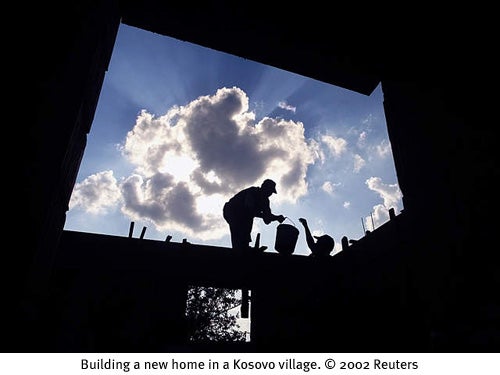As Kosovo is poised to declare independence, the new government and its international partners should build a state based on democratic principles and the rule of law, Human Rights Watch said in a seven-point human rights agenda for Kosovo issued today. The European Union-led mission charged with stabilizing the breakaway province once it secedes from Serbia should take urgent steps to prevent human rights abuses, particularly against minorities and women.
“The 1999 military intervention in Kosovo was premised on protecting the human rights of Albanians who were then being abused by the Serbian government,” said Holly Cartner, director of Human Rights Watch’s Europe and Central Asia division. “It’s thus absolutely imperative that the new Kosovo respect the human rights of all its communities.”
The Human Rights Watch memorandum, “A Human Rights Agenda for a New Kosovo,” identifies seven of the most pressing human rights concerns in Kosovo today:
- The inadequate criminal justice system;
- Domestic violence and other abuse of women;
- Violence against ethnic minorities;
- The inability of refugees and displaced persons to return safely to their homes;
- The plight of the Roma, Ashkali and Egyptian communities;
- Inadequate oversight over international institutions; and
- Lack of inter-ethnic reconciliation.

To help identify the key concerns, Human Rights Watch consulted human rights groups across Kosovo’s different ethnic communities.
Chief on the agenda is to strengthen the criminal justice system that has been unable to combat the crime that affects all of Kosovo’s residents, regardless of ethnicity. Key defects include poor coordination between national and international police, prosecutors and judges, and inadequate witness protection. Western states are reluctant to relocate and protect witnesses at risk. An EU police and justice mission of almost 2,000 personnel will be the main element of the new EU-led international mission.
It is imperative that Kosovo authorities and the EU-led mission protect minorities from the violence that has been a persistent feature of Kosovo’s postwar history. In addition to physical protection from the Kosovo Police, EU police and NATO forces, ending the cycle of violence means prosecuting those responsible for the crimes.
Of particular concern are the Roma, Ashkali and Egyptian communities, Human Rights Watch said. Politically powerless and economically excluded, they are subject to discrimination and harassment. Askhali and Egyptian communities are disproportionately affected by forced returns from Western Europe (Serbian-speaking Kosovo Roma, deemed at greater risk, are sent to Serbia instead). The limited assistance for those who return creates a burden on already marginalized communities.
“The EU’s decision to focus its efforts on the justice system is the right one,” said Cartner. “But unless EU states are willing to relocate witnesses at risk, it will be next to impossible to deliver justice for some of the most serious crimes.”
Tackling domestic violence, trafficking and other abuses against women across all communities should also be a priority. Human Rights Watch recommended that the authorities improve access to justice for abused women, and allocate sufficient resources to ensure that every municipality has a safe house for victims of domestic violence.
The Kosovo government and international agencies should also work to create conditions for the sustainable voluntary return of refugees and displaced persons. To date, fewer than 18,000 of the 250,000 Serbs, Roma and others displaced since June 1999 have returned. Insecurity, the failure to bring to justice those responsible for attacks on minorities, and discrimination in accessing social services provide part of the explanation.
The EU-led mission to Kosovo faces a huge challenge to assist Kosovo’s authorities with these difficult problems. To lead by example and enhance its legitimacy with the population, it should subject itself to much greater scrutiny and accountability than its United Nations predecessor. In particular, the EU police and justice mission should be subject to independent human rights oversight by Kosovo’s Ombudsperson Institution.
Only when the human rights grievances of both the majority Kosovo Albanians and Kosovo’s minority communities are sufficiently addressed can basic trust be established and reconciliation begin, Human Rights Watch said. Establishing individual criminal responsibility for past abuses and determining the fate of the more than 2,000 missing persons – the majority of whom are ethnic Albanian – are crucial steps in that process.
“The residents of Kosovo – Albanians, Serbs, Roma and others – have suffered serious human rights abuses for many years,” Cartner said. “With the right commitment and support from the EU, there is now a genuine opportunity to create a Kosovo where human rights violations are the exception and not the norm.”






